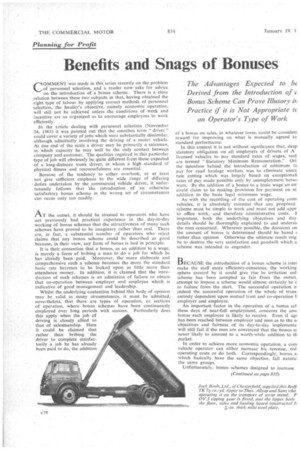Benefits and Snags of Bonuses
Page 66

If you've noticed an error in this article please click here to report it so we can fix it.
COMMENT was made in this series recently on the problem of personnel selection, and a reader now asks for advice on the introduction of a bonus scheme. There is a close relation between these two subjects in that, having obtained the right type of labour by applying correct methods of personnel selection, the haulier's objective, namely economic operation, will still not be achieved unless the conditions of work and incentive are so organized as to encourage employees to work efficiently.
In the article dealing with personnel selection (November .24, 191) it was pointed out that the omnibus term " driver " could cover a variety of jobs which were substantially dissimilar, although admittedly involving the driving of a motor vehicle. At one end of the scale a driver may be primarily a salesman, in which capacity he may well be the only contact between company and customer. The qualities required in this particular type of job will obviously be quite different from those expected of a long-distance trunk driver, in whom a high standard of physical fitness and resourcefulness are essential.
Because of the tendency to either overlook, or at least not give sufficient emphasis to the wide range of differing duties undertaken by the commercial vehicle driver, it unfortunately follows that the introduction of an otherwise satisfactory bonus scheme in the wrong set of circumstances can occur only too readily.
AT the outset, it should be stressed to operators who have not previously had practical experience in the day-to-day working of bonus schemes that the attractiveness of many such schemes have proved to be imaginary rather than real. There are, in fact, a substantial number of operators who reject claims that any bonus scheme could be described as good because, in their view, any form of bonus is bad in principle.
It is their contention that a bonus, as an addition to a wage, is merely a form of bribing a man to do a job for which he has already been paid. Moreover, the more elaborate and comprehensive such a scheme becomes the more the standard basic rate becomes to be looked upon as little more than attendance money. In addition, it is claimed that the introduction of such schemes is an admission of failure to obtain that co-operation between employer and employee which is indicative of good management and leadership.
Whilst the underlying contention behind this body of opinion may be valid In many circumstances, it must be admitted, nevertheless, that there are types of operation, or sections of operation, where bonus schemes have been continuously employed over long periods with success. Particularly does this apply when the job of driving is closely allied to that of salesmanship. Here it could be claimed that rather than bribing. 'the driver to complete satisfactorily a job he has already been paid to do, the addition.
of a bonus on sales, in whatever form, could be considerc reward for improving on what is mutually agreed to standard performance.
In this context it is not without significance that, desp statutory obligation on all employers of drivers of A licensed vehicles to pay standard rates of wages, suet are termed "Statutory Minimum Remuneration." On the intention behind the introduction of minimum ra pay for road haulage workers was to eliminate unecc rate cutting which was largely based on exceptional] rates of pay made possible only by unemployment hetwc wars. By the addition of a bonus to a basic wage an err could claim to be making provision for payment on m addition to the basic legal minimum wage.
As with the recording of the cost of operating corm vehicles, it is absolutely essential that any proposed scheme must be simple to work and must not add appr. to office work, and therefore administrative costs. important, both the underlying objectives and day details should be thoroughly explained to and undersU the men concerned. Wherever possible, the decisions on the amount of bonus is determined should be based c rather than opinion. Otherwise the ultimate result mig be to destroy the very satisfaction and goodwill which a scheme was intended to engender.
BECAUSE the introduction of a bonus scheme is inter make the staff more efficiency-conscious, the working sphere created by it could give rise to irritation unl. scheme has been accepted as fair from the outset. attempt to impose a scheme would almost certainly be c to failure from the start. The successful operation o indeed the successful operation of the whole of trans; entirely dependent upon mutual trust and co-operation employer and employee.
An important factor in the operation of a bonus set these days of near-full employment, concerns the amc bonus each employee is likely to receive. Even if agr has been reached between employer and men as to the s4 objectives and fairness of its day-to-day implementa will still fail if the men are convinced that the bonus ez never likely to amount to a worth-while addition to th packet.
In order to achieve more economic operation, a com vehicle operator can either increase his revenue, red operating costs or do both. Correspondingly, bonus s. which basically have the same objective, fall naturai the same groups.
Unfortunately, bonus schemes dosigned to increase












































































































